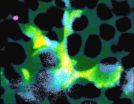Anxiety increases the risk of gastrointestinal infection and long-term complications
2015-07-02
(Press-News.org) A team comprised of scientists at VIB, KU Leuven and UZ Leuven has made significant progress in uncovering the connection between psychological factors and the immune system. Their findings are based on an investigation of a massive drinking water contamination incident in Belgium in 2010, and are now published in the leading international medical journal Gut.
In December 2010, the Belgian communities of Schelle and Hemiksem in the province of Antwerp faced an outbreak of gastroenteritis, with more than 18,000 people exposed to contaminated drinking water. During the outbreak, VIB and KU Leuven set up a scientific task force to study the incident's long-term effects, led by Guy Boeckxstaens (UZ Leuven / KU Leuven) and Adrian Liston (VIB / KU Leuven).
Seizing an unexpected opportunity
Adrian Liston (VIB/KU Leuven): "The water contamination in Schelle and Hemiksem was an 'accidental experiment' on a scale rarely possible in medical research. By following the patients from the initial contamination to a year after the outbreak we were able to find out what factors altered the risk of long-term complications."
Anxiety and depression affect immune system
The scientists found that individual with higher levels of anxiety or depression prior to the water contamination developed gastrointestinal infections of increased severity. The same individuals also had an increased risk of developing the long-term complication of irritable bowel syndrome, with intermittent abdominal cramps, diarrhea or constipation a year after the initial contamination.
Guy Boeckxstaens (UZ Leuven / KU Leuven): "Irritable Bowel Syndrome is a condition of chronic abdominal pain and altered bowel movements. This is a common condition with large socio-economic costs, yet there is so much that still remains to be discovered about the causes. Our investigation found that that anxiety or depression alters the immune response towards a gastrointestinal infection, which can result in more severe symptoms and the development of chronic irritable bowel syndrome."
Psychological factors key in preventing long-term complications
The study's results provide valuable new insight into the cause of irritable bowel syndrome, and underscoring the connection between psychological factors and the immune system.
Adrian Liston (VIB/KU Leuven): "These results once again emphasize the importance of mental health care and social support services. We need to understand that health, society and economics are not independent, and ignoring depression and anxiety results in higher long-term medical costs."
INFORMATION:
ELSE PRESS RELEASES FROM THIS DATE:
2015-07-02
Scientists have pioneered the use of a high-powered imaging technique to picture in exquisite detail one of the central proteins of life - a cellular recycling unit with a role in many diseases.
The proteasome complex is present in all multicellular organisms, and plays a critical role in cancer by allowing cancer cells to divide rapidly.
Researchers used a technique called electron cryo-microscopy, or 'cryo-EM' - imaging samples frozen to -180oC - to show the proteasome complex in such extraordinary detail that they could view a prototype drug bound to its active sites.
The ...
2015-07-02
This news release is available in German. Acute liver failure is a rare yet life-threatening disease for young children. It often occurs extremely rapidly, for example, when a child has a fever. Yet in around 50 percent of cases it is unclear as to why this happens. Now, a team of researchers working on an international research project headed by Technische Universität München (TUM), the Helmholtz Zentrum Munich and Heidelberg University Hospital have discovered a link between the disease and mutations in a specific gene. The researchers used whole genome ...
2015-07-02
New research led by the University of Southampton is paving the way to protect the endangered European eel as they migrate through rivers to the ocean.
The European eel, a fish of high cultural, commercial and conservation concern, has suffered a dramatic decline over recent decades, with the number of juvenile fish returning to rivers down by over 90 per cent.
While several explanations (including overfishing, pollution and climate change) have been proposed for the cause of this demise, one of the key factors is river infrastructure, such as hydropower stations, ...
2015-07-02
This news release is available in Japanese.
Researchers at the Okinawa Institute of Science and Technology Graduate University (OIST) have identified a system that could store quantum information for longer times, which is critical for the future of quantum computing. This study was recently published in Physical Review Letters.
Quantum computing -- which aims to use particles on the atomic scale to make calculations and store the results -- has the potential to solve some key problems much faster than current computers.
To make quantum computing a reality, ...
2015-07-02
(NEW YORK CITY - July 1, 2015) A novel synthetic hormone that makes certain skin cells produce more melanin significantly increases pain-free sun exposure in people with erythropoietic protoporphyria, a rare, genetic disorder resulting in excruciating pain within minutes of sun exposure. Two Phase III trials, conducted in Europe and in the United States by researchers at the Icahn School of Medicine at Mount Sinai and six other U.S. sites, showed that the duration of pain-free time in the sun and quality of life were significantly improved by treatment with afamelanotide, ...
2015-07-02
Pregnancy and motherhood are both wonderful and worrisome times - could public health campaigns and social stereotypes be contributing to anxiety for mothers? Researchers from Monash University have identified links between perinatal anxiety and social and health messages that women are exposed to during the perinatal period, the period immediately before and after birth.
In a paper recently published in Women's Studies International Forum, Dr Heather Rowe and Professor Jane Fisher from the Jean Hailes Research Unit within the School of Public Health and Preventive Medicine ...
2015-07-02
Unwanted, intrusive visual memories are a core feature of stress- and trauma-related clinical disorders such as posttraumatic stress disorder (PTSD), but they can also crop up in everyday life. New research shows that even once intrusive memories have been laid down, playing a visually-demanding computer game after reactivating the memories may reduce their occurrence over time.
The findings are published in Psychological Science, a journal of the Association for Psychological Science.
"This work is the first to our knowledge to show that a 'simple cognitive blockade' ...
2015-07-02
Spider-like cells inside the brain, spinal cord and eye hunt for invaders, capturing and then devouring them. These cells, called microglia, often play a beneficial role by helping to clear trash and protect the central nervous system against infection. But a new study by researchers at the National Eye Institute (NEI) shows that they also accelerate damage wrought by blinding eye disorders, such as retinitis pigmentosa. NEI is part of the National Institutes of Health.
"These findings are important because they suggest that microglia may provide a target for entirely ...
2015-07-02
A new method for calculating the exact time of death, even after as much as 10 days, has been developed by a group of researchers at the University of Salzburg.
Currently, there are no reliable ways to determine the time since death after approximately 36 hours. Initial results suggest that this method can be applied in forensics to estimate the time elapsed since death in humans.
By observing how muscle proteins and enzymes degrade in pigs, scientists at the University of Salzburg have developed a new way of estimating time since death that functions up to at least ...
2015-07-02
When remembering something from our past, we often vividly re-experience the whole episode in which it occurred. New UCL research funded by the Medical Research Council and Wellcome Trust has now revealed how this might happen in the brain.
The study, published in Nature Communications, shows that when someone tries to remember one aspect of an event, such as who they met yesterday, the representation of the entire event can be reactivated in the brain, including incidental information such as where they were and what they did.
"When we recall a previous life event, ...
LAST 30 PRESS RELEASES:
[Press-News.org] Anxiety increases the risk of gastrointestinal infection and long-term complications


